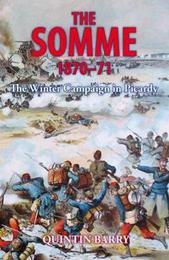
|
The Somme 1870-71: The Winter Campaign in Picardy
Hardback
Main Details
| Title |
The Somme 1870-71: The Winter Campaign in Picardy
|
| Authors and Contributors |
By (author) Quintin Barry
|
| Physical Properties |
| Format:Hardback | | Pages:296 | | Dimensions(mm): Height 234,Width 156 |
|
| Category/Genre | Military history |
|---|
| ISBN/Barcode |
9781909384491
|
| Classifications | Dewey:943.08242 |
|---|
| Audience | |
|---|
| Illustrations |
50 illustrations, 8 colour maps
|
|
Publishing Details |
| Publisher |
Helion & Company
|
| Imprint |
Helion & Company
|
| Publication Date |
29 January 2015 |
| Publication Country |
United Kingdom
|
Description
After the battle of Sedan on September 1, 1870 and the collapse of the Second Empire, followed by the investment of Paris, the Government of National Defence set about raising fresh armies. These had as their first objective the relief of the capital. The German troops covering the investment were stretched extremely thin until the fall of Metz at the end of October 1870. This released the forces around the city to move north and west to deal with the newly-forming French armies. The German Campaign in the northeast of France was conducted by the First Army led by General Edwin von Manteuffel. Opposing him was the French Army of the North, initially commanded for a short time by General Charles Bourbaki. He was soon replaced by General Louis Faidherbe, who was sent far from Africa. The Campaign was fought to a large extent over the area of the Somme battlefields of the First World War, and the names of the towns and villages are grimly familiar with the resonance of what was to come. In 1914-1918 the direction of the fighting was on an east - west axis; in 1870 - 1871 it was north-south, with the line of the Somme being crucial to the outcome of the Campaign. The first major battle was the battle of Amiens on November 24; fought before Faidherbe's arrival, the Army of the North was led by the Chief of Staff, General Farre. It resulted in a German victory and the capture of Amiens. In December, Faidherbe advanced and took up a strong defensive position along the line of the River Hallue, where a fierce battle was fought on December 23. After the French retreat, Faidherbe regrouped, and advanced again, this time on Bapaume. Another fierce encounter followed on January 3, at the end of which each side believed itself to be defeated. Faidherbe was thwarted in his objective to lift the Siege of Peronne, which fell on January 9. The Author draws on a wide range of rare contemporary sources to describe the Campaign, which was fought in appalling weather conditions. The book is copiously illustrated, with specially drawn colour battle maps to demonstrate the course of the Campaign, and also includes extensive orders of battle. This is the latest title in Helion's ground-breaking series of 19th Century studies, and will again appear in hardback as a strictly limited edition printing of 500 copies, each individually numbered and signed by the author on a decorative title page.
Author Biography
Quintin Barry is a solicitor and a retired Employment Judge. He has also held a variety of offices in both the public and private sector, including the NHS and local radio. He is presently Secretary General of an international group of law firms. Following a lifelong interest in history & naval history, he is the author of a number of books on military history. These include an acclaimed two-volume history of the Franco-Prussian War of 1870-1871, a history of the Austro-Prussian War of 1866, and the first modern history of the Russo-Turkish War of 1877-1878. He has made a particular study of the life and career of Helmuth von Moltke. He has also written a biography of the 17th Earl of Derby, which was published in 2012.
Reviews... the book is a stark representation of a continent charging towards a war more vast and awful than its individual nations could have ever known at the time. * History of War Magazine 04/09/2015 * ... a very useful and well balanced book which covers a neglected subject in detail. Armed with this book, one can follow the campaign on the ground, or stage a mini-campaign, using the wargames figures one already has for the 1870 campaign. Strongly recommended for anyone with a passing interest in the Franco-Prussian War. * Miniature Wargames - John Drewienkiewicz 27/04/2015 * an important and readable contribution to the literature of 19th century history. * Books Monthly 15/02/2015 *
|